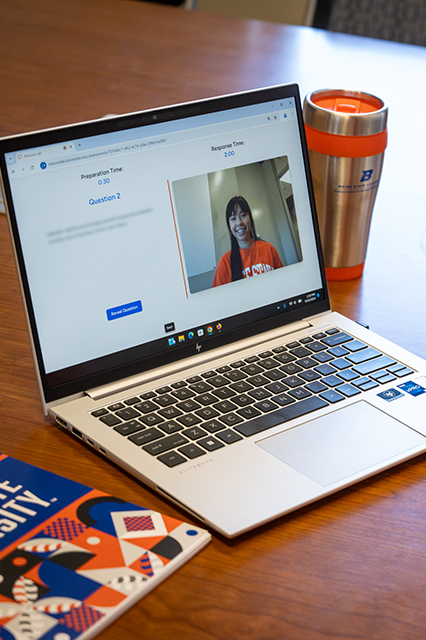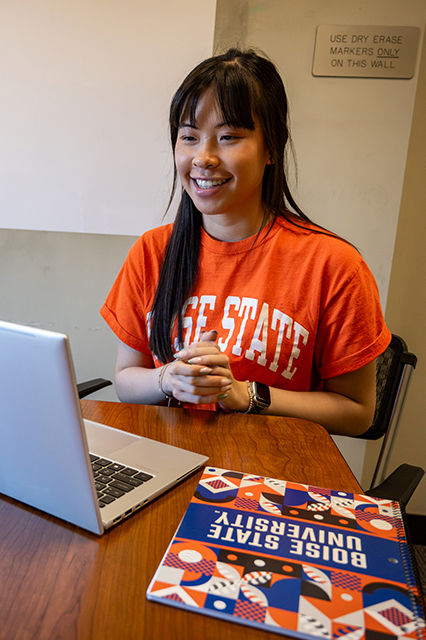Help Shape the Future of Assessment in the Age of AI
Join us as we pioneer authentic assessments that boost student engagement and critical thinking—no AI shortcuts.
Sign Up NowAs educators, ensuring students can explain their reasoning, justify creative or analytical decisions, and demonstrate real knowledge is essential—especially in the age of AI.
With the rise of AI tools, it’s becoming harder to know how much of a student’s work is really their own thinking. That’s why Boise State’s Dr. Steven Pentland created the asynchronous oral assessment platform, Rhetorix Lab. His research explores how asynchronous oral exams may enhance student learning, communication skills, and authentic assessment practices.
We need your help to further this research. We are currently seeking Boise State instructors eager to integrate Rhetorix Lab into their courses for Fall 2025.
By joining this research, you’ll have the opportunity to evaluate a new assessment solution in your courses. Your insights will help ensure that faculty-led innovation meets real classroom needs while advancing research on effective assessment in the age of AI.
Join Rhetorix Lab and help shape the future of assessment.


The Benefits of Rhetorix
Ensure Authentic Student Work
Oral responses let students demonstrate their thinking in their own words—keeping AI-generated content at bay.
Save Time with Flexible Assessments
Students record on their schedule while you review assessments at your convenience.
Seamless in Canvas
No extra logins or steep learning curves—Rhetorix integrates directly into your Canvas courses.
Boost Student Engagement
Encourage deeper learning as students actively articulate their reasoning and thought processes.
Career-readiness
Build professional communication skills to prepare students for internships, video interviews, and future careers.
Shape Boise State Innovation
Influence the future of assessment. Contribute to research and help innovate effective academic practices.
Why Oral Assessments Matter More Than Ever
Traditional written assessments—essays, short answers, discussion posts, and case analyses—are increasingly vulnerable to AI-generated content, making it harder to assess authentic student work.
Oral assessments require students to explain their reasoning in their own words—demonstrating critical thinking and communication skills. They also boost engagement, as students actively articulate their thought processes, promoting deeper learning and ownership.
While traditional oral assessments can be time intensive and hard to schedule with larger classes, Rhetorix streamlines this process and delivers flexibility without sacrificing quality.
Want to See Rhetorix Lab in Action?
Learn More About the Research
The research being conducted using Rhetorix Lab focuses on how asynchronous oral assessments impact student learning, engagement, and communication skills, while gathering valuable insights from instructors on their usefulness and value.
Research Questions
How do students perform on oral assessments compared to traditional written formats like multiple-choice exams and essays? If performance aligns, oral assessments could enhance communication skills while reliably measuring the same knowledge as traditional assessments.
Do students change their study habits when preparing for oral assessments compared to written tests? Research suggests oral exams encourage deeper preparation — we’ll investigate whether asynchronous formats do the same.
Do students feel oral assessments reflect their knowledge accurately? Do instructors believe they provide deeper insights into student understanding?
Frequently Asked Questions
Q: How do I get started with research participation?
A: After signing up, we’ll schedule a one-on-one orientation to show you how Rhetorix Lab integrates into your course.
Q: What kind of ongoing support can I expect?
A: We provide comprehensive support—from assignment development to troubleshooting—to ensure a seamless experience.
Q: How does Canvas integration work?
A: Rhetorix Lab is accessible directly through Canvas, eliminating extra registration steps and simplifying usage.
Q: Is there any cost to use Rhetorix Lab?
A: No, there is no charge for using Rhetorix Lab within Boise State University. It was developed to assess the effectiveness of Asynchronous Oral Assessments in academic settings.
Q: What are the possible use-cases for Rhetorix Lab?
A: The platform can be used for online discussion posts, journal entries, exams, project updates, and more. We’re also interested in learning how you might extend its use beyond these examples.
Q: How is data collected during participation?
A: Typically, you and your students will complete a survey about your experience—usually within a week of the final assignment. If Rhetorix Lab is used alongside traditional written assessments, we might request anonymized grade data to evaluate its effectiveness, ensuring all subject protections are in place through coordination with the Office of Research Compliance.